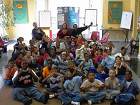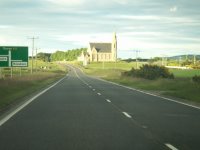
Burgh /Anti-burgh
In 1745 the seceders started to debate whether the burgess oath might be legitimate.
The oath was an acknowledgement of the true religion professed with in its realm. By 1747 they had split into burgh (for the oath) and anti-burgher. The anti burghers took the burghers to the church bar, and when they were never turning up they were in turn deposed and ex-communicated. In 1795 a large problem came to a head over subscription to the Westminster Confession.
Westminster Confession
While most independent churches would avoid confessions, creeds or formal documents as to the basis for constituting a church within the Church of Scotland and future Presbyterian splits leaders over the years struggled with the need of a defending statement that would stand the test of time and accommodate modern change yet not dilute the basis of the church and the truth. An "Athenian Creed" was offered by John Witherspoon to stop the easy-going way of the moderates in the church. This document had a feel of Deism and this may have annoyed the moderates (Deism- God created the earth but does not intervene in the course of nature and human affairs.), especially when Deism does not recognise miracles. The moderates were unable to write a distinct theology because they were bound by the Westminster confession (They could not publicly denounce it).
In 1766 Alexander Ferguson of Kilwinning in a "Scots magazine" article maintained that no church had a right to impose a detailed confession except in so far as it could be justified by scripture. Subscription to the confession therefore, at that time, must be made not that it is absolutely true but only in as far as it is scriptural.
Ferguson was making steps for a more liberal theology but with important grounded Christian doctrine. This was a step more spiritual than parliament had anticipated. It had enacted the confession only for a test of Presbyterian conformity. Twenty years later Dr William Gill took the process further by using fresh language to highlight doctrine in "A practical essay on the death of Christ".
The outcome was a polarisation of Moderates on the one hand teaching tolerance and good conduct as needful more than precise theology- all this as the age of Enlightenment dawned.
The rest supported by David Hume who saw the Moderates theology as weak and dependent on miracles. Hume was from a classical education and relied on those classics as his basis for thought. Although brought up in the same geographical area of Edinburgh as Ebenezer and Ralph Erskine, Hume, was from a different outlook of intellect no miracles and of the world of new thought. In his “Treatise of Human Nature” he set out a philosophy -which ends up at a dead end, in as much as he had no positive conclusion apart from nothing really changes.
Auchterarder creed
At a time when the church was suspicious of the Westminster confession, most likely concerning the thought that this confession might contain heretical thoughts, members of the presbytery of Auchterarder, created a question and answer system for a new student of the ministry. The statement put to him was " It is not sound and orthodox to teach that we must forsake sin, in order to our coming of Christ, and instating us in covenant with God." The probationary young student failed to see that what was meant, in disguise was Christ died to save sinful men. The student appealed to the Assembly who upheld his case condemning the presbytery for its "Auchterarder creed" which evidently caused confusion.

 September is well upon us and the garden will now start its downward trend as plants start the hibernating for the winter.
September is well upon us and the garden will now start its downward trend as plants start the hibernating for the winter.











